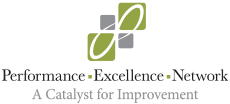ASCENDING TOGETHER: 41 Insights from PENworks 2023 — May 2023
May 22, 2023
PEN hosted our annual conference — PENworks 2023 — three weeks ago. As it (somehow) has become tradition, I walked on stage in costume — this year as a mountain climber, reflecting the conference theme of ASCENDING TOGETHER: Connect, Discover, Imagine. Yeah, it was hot in four layers of clothing. And I felt a little silly. But it got a few chuckles and it drove home the metaphor: just like in mountain climbing, in business and professional settings we need collaboration and partnerships to tackle challenges, climb to greater heights, better performance, and a brighter, more successful tomorrow. After navigating more than three years of extraordinary challenges — the pandemic, inflation, staffing issues, supply chain issues, shifting work environments, political & civil unrest, stress & burnout — we’re all ready to move forward (to move upward), ascending to a higher plane, improved performance, and a better, more optimistic future.
Personally, I think the committee did a great job in picking the mountain climbing theme for the conference, as it represents:
- setting stretch goals
- collaborating, sharing, and working together — an all-for-one and one-for-all philosophy
- a focus on safety (one error in climbing could be fatal), but also in taking intelligent risks
- rising to the occasion — accomplishing things you didn’t think you could accomplish, as an individual, as a team, as an organization or a community
- celebrating those milestones, so you can build momentum and tackle the next highest hurdle, and
- the importance of leadership, commitment, and perseverance in accomplishing almost anything worth accomplishing.
You get the metaphor, I’m sure. PENworks 2023 was about lifting each other up: ascending together; learning from each other; making and deepening connections; creating energy, momentum, and positivity.
If you attended (either in person or online), thank you! I sincerely hope you collected a few ideas to improve yourselves, your teams, your organizations, and your communities. And if you didn’t attend, you can obtain an on-demand recording of the full conference (or any of the sessions) by clicking here! Individual sessions are $9 for PEN members ($19 for non-members); the full conference is $49 for members ($99 for non); email PEN for the member code (and attendees get the proceedings for free). I think you’ll find the conference absolutely full of insights that help us all ascend together.
Here are a few of those insights from our opening and closing keynotes, as well as from a panel discussion with leaders from organizations who have received the prestigious Malcolm Baldrige National Quality Award — world class organizations that could help us all ascend together…
Insights from Dr. Bryan Williams, Opening Keynote
“The general rule is: if you want someone to put more caring into their work, you have to put more caring into the person. [In other words], I need to know that you care about me and that will unlock my discretionary effort. If you want your team to give their whole heart, lead with your whole heart; if you want your team to serve with excellence, serve them with excellence.”
As leaders, ask yourself daily: “if your team could rehire you tomorrow, would they?”
“You can buy a man’s time; you can buy his physical presence at a given place; you can even buy a measured number of his skilled muscular motions per hour. But you cannot buy enthusiasm…you cannot buy loyalty…you cannot by devotion of hearts, minds or souls. You must earn these.” — Clarence Francis (as shared by Williams)
“If you want to re-earn the hearts of your team, you have to give it first. As I live each day, my goal is not to wait for what I can get, it’s to see what I can give. My mission is to serve first: I will encourage first; I will love first; I will help first; I will give first; I will live first; I will show gratitude first; I will give recognition first. Me first! I’m alive, so I will live; I received, so I will give — first!”
As leaders, it’s easy to think you believe in someone on your team “because they perform well. [But it’s really the opposite]: they perform well because you believe in them.”
“To re-earn the hearts of your team, value your people.”
“Gallup says 74% of workers are willing to learn new skills or retrain in order to remain employable [and that number is increasing. Therefore], one of the most powerful ways keep your team engaged is to provide learning opportunities.”
“If you want people to be engaged, empower them. [And] the biggest barrier to empowering your team is your trust in the team.”
“One of the most powerful ways to create a culture of belonging is to share your purpose, mission, and values, talk about them regularly, and tie everything to them.”
Sometimes leaders “unintentionally diminish the decision-making abilities and the ownership of people who want to own what they do. As leaders, empower your team — don’t need to be needed.”
Leaders: “train others to replace you.”
Leaders should focus on results: “…share them and expect your team to know how their performance impacts the results.”
“Act like every job you ever hold you’re the CEO of that job — be the CEO of the towels; be the CEO of the lobby; be the CEO of the parking garage.” It creates ownership; it creates engagement.
“In a salad, each ingredient can’t hide — they’re all designed to stand out. That’s what diversity is all about: each team member needs to stand out, because they each bring something different, unique, and exceptional to the team.”
Good leaders “understand and treat all people well. Check your biases.”
“Every time you have something that’s rare and valuable, it’s called a masterpiece.” Every human is unique, so every human is a masterpiece. “Don’t try to be like anyone else, because no one else can be a better you than you. Don’t diminish who you’re called to be — stand out!”
“Everyone you will ever meet knows something that you don’t. Everyone can learn something from everybody.” See the value in every person.
Leaders: “Let everything you say be good and helpful so that your words may be an encouragement to those who hear them. Words matter.”
“When someone is intentionally using their talents and strengths every day, they’re more engaged, they’re more productive, they’re burned out less. Every metric goes up when you’re doing what you love to do.” Every leaders should focus on their team’s strengths.
“A group is strong only if each person is strong in the group.” As a team, build links that have “strength, togetherness, friendship, interdependencies. [Remember that] you can do things that I can’t do, and I can do things that you can’t do. Therefore, we need each other.”
Insights from Genein Letford, Closing Keynote
“Creative thinking is the process of problem finding and problem solving with relevancy, value, and novelty. It requires divergent thinking, reframing, combinatory thinking, finding associations, and metaphorical thinking. The World Economic Forum claims that creative thinking is the #1 skill needed [in today’s complex world].”
“Cultural competence is the ability to observe similarities and differences with complexity to adapt behavior in various cultural situations. If you work at it, you’ll get better — it starts with self-awareness, other awareness, and situational awareness.” The goal is to find people for your team with this skill.
“Cultural competence is a choice — and it requires a creative mindset rather than a fixed mindset.”
Based on neuroscience, our “brains love routine — they are designed to keep us alive, so love things that are efficient [and predictable]. Creativity is not efficient because you’re entering into the unknown, so creativity requires a deliberate investment.”
“Connection leads; creativity [and success] follows. People work better together when they’re allowed to socialize and connect. Experience provides connection, so be open to [new] experiences.”
“Depending on where you grew up and what you’ve been exposed to, it affects what you see and how you experience things. Creativity requires cultural observation.”
“If creativity drives innovation, curiosity drives creativity.”
“You can build curiosity in your leadership. Good executives who know how to be curious and work that muscle are able to use the resources they have in front of them now, but they’re also cognizant of looking around the corner and using their imagination of what is to come.”
“Psychologically safe [work] environments increase curiosity.” Leaders should create that environment.
“Humility is essential for good leadership. The higher you go in an organization, the less creative you become because you aren’t taking the perspective of others unless you’re intentional about it.”
“In today’s VUCA [Volatile, Uncertain, Complex, Ambiguous] world, successful people need play (which generates dopamine and serotonin), others (we need social connection), and downtime (rest, reflection, and subconscious processing).”
“Innovation happens at the intersection of fields, disciplines, and cultures.”
“Successful people build bridges — they are connectors.”
Insights from the Baldrige Leadership Panel
The final set of insights come from three leaders who have reached the proverbial top of the mountain, all recipients of the Baldrige National Quality Award:
- Andy Strebe, General Manager of Chalmers Ford, New Mexico (2016 recipient)
- JoAnn Sterke, Superintendent (former), Pewaukee Schools, Wisconsin (2013 recipient)
- Michelle Tierney, EVP of Organizational Development, Southcentral Foundation, Alaska (2011 & 2017 recipient)
“Baldrige helps organizations get better at getting better.” — Sternke
“Success is always about four things: people, plan, results, and process. It’s also about purpose and passion and about pursuing improvement with intentionality and focus.” — Sternke
“Our success is based on a simple philosophy: real simple, real people, real value.” — Strebe
“Sustaining high performance requires succession planning, as many of our leaders have (or will) change.” — Tierney
“Excellence requires innovation and open mindedness. None of us saw the pandemic coming [maybe we needed a better planning process!], but sustaining performance through that time required agility, responsiveness, creativity, and resilience.” — Strebe
“Excellence is sustained only with leadership commitment: leaders need to avoid complacency and keep the fire alive for improvement.” — Sternke
“Excellence starts with leadership.” — Strebe
“Excellence is not a project — it’s a journey that requires constancy of purpose.” — Tierney
I hope there were a few nuggets in those quotes to inspire some reflection — maybe even some action. If you want to dive deeper, check out the conference on demand by clicking here! There were 16 other sessions throughout the day, full of insights, tips, tools, and best practices to help improve leadership & personal performance, organizational and community outcomes!
We’ve all experienced a remarkable last three years, but — as they say — with every challenge comes opportunity. Here’s to ascending together to a better brighter, better tomorrow.
What other insights/tips do you have on performance excellence? Participate in a discussion on this topic: visit our LinkedIn group to post a comment.
Never stop improving!
Brian S. Lassiter
President, Performance Excellence Network
www.performanceexcellencenetwork.org
Catalyst for Success Since 1987! Photo credits PEN











